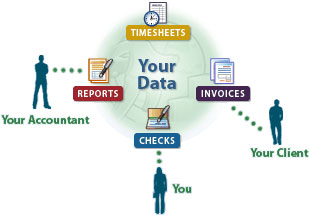Next Google Apps targets: Intuit QuickBooks, MS Money?

Posted by Donna Bogatin
Google has unleashed an integrated suite of Web-based software-as-a-service office productivity applications—Google Apps for Your Domain—featuring four services, with two more on the way:
- Gmail web email
- Google Talk instant messaging and voice calling
- Google Calendar collaborative calendaring
- Google Page Creator web page design, publishing and hosting
- Google Spreadsheets (coming)
- Writely Word Processor (coming)
MS Money primarily addresses the home and home office market, but Microsoft Small Business Accounting uses the standard Microsoft Office interface and offers a way of “Integrating business contact information with financial data”:Microsoft is currently promoting a free “CD trial kit” with a trial version of Small Business Accounting 2006; the boxed product sells for $79.99 at Amazon.
Using Business Contact Manager for Outlook with Small Business Accounting enables the user to share all the necessary data about customers – financial history, email, tasks, business notes, appointments and opportunities – into a suite of interlocking information based on Outlook, a program with which most small businesses are already familiar.
Intuit, however, is already featuring a QuickBooks online accounting software edition, and targets the lucrative business and retail markets. QuickBooks online subscription starts at $19.95 monthly.
QuickBooks' feature set enables businesses to:
- Prepare estimates for customer quotes, bids and proposals
- Create, print and email invoices that are right for your business
- Create charges, billable expenses, and time activities that flow on to invoices
- Accept credit card payments
- Track and manage outstanding bills
- Write and print checks, track credit card use and cash purchases
- Keep a list of vendors and their contact information
- Access and update customer information quickly and easily from one place
- Manage payroll Grant employees and subcontractors access to enter in time worked
- Prepare and print 1099s…
Intuit is targeting the mobile workforce and proclaims “Work Smart, Work Online — You'll Always be in Control”:
- Anytime, Anywhere: access your finances from work, home or on the road
- Access Control: Control who accesses your Online Edition finances and what they see with password protection and multiple permission levels
- Multiple Users: Allow multiple users to access your Online Edition company
- Automatic Data Back-up: data backed up automatically, every day
- Local Copy of Data: Download a copy of your data to your PC
Google vice president and general manager, enterprise, Dave Girouard, says:
Organizations of all sizes face a common challenge of helping their users communicate and share information more effectively.
Organizations of all sizes, and individuals, need to communicate and share a range of financial information:
Microsoft touts MS Money: “All your finances, all in one place.”
Intuit touts Quicken: “See where your money goes.”
Google would undoubtedly be interested in seeing where organizations’ “money goes” and having “all the world’s” financial data “all in one place.” To date, however, Google’s foray into the cash registers of businesses and the wallets of individuals has not been a ringing success, as I discuss in “Google miscalculates with Google Checkout”:
Because real money is at stake, Google Checkout is not a harmless, Google 'technology playground' project. Google Checkout plays in the real world where merchant profits, individuals’ pocketbooks and competitor revenue streams are on the line.A Google hosted financial application, in fact, might very well represent the most ominous of Google’s prospective collection, analysis, archiving and retention of organizations’ and individuals’ private data.
How has Google delivered with its Google Checkout? Only two months out, Google Checkout is feeling the heat from all sides…
Google Checkout has been beset by both customer and merchant defections due to unsatisfactory service and infrastructure shortcomings.
SENSITIVE DATA EXPOSURE RISKS TO ORGANIZATIONS
Client Lists
Vendor Relationships
Contractual Agreements
Salary Negotiations
Tax Returns
Asset Base
Liability Profile
Insurance Policies
Inventory Levels
Sales Records…
SENSITIVE DATA EXPOSURE RISKS TO INDIVIDUALS
Tax Returns
Consumer Credit Status
Credit Card Activity
Bank Account Records
Purchasing History
Cash Transactions
Debt Levels
Health Related Disbursements
Real Estate Holdings
Equity Investments…
In “Google’s not so fine print: Google Apps TOS put Google first” I discuss the risks that users of Google Apps for Your Domain expose themselves to and conclude:
When it comes to an organization's applications hosting, Google's 'free' comes at a heavy cost.A prospective Google hosted financial application would undoubtedly be even riskier. In “Google GMail personal data mining: Where is the outrage?” I discuss how Google already openly states it data mines personal email communications, and sells ads against the personal data.
According to Google:
Gmail is an experiment in a new kind of webmail, built on the idea that you should never have to delete mail…Use Google search to find the exact message you want, no matter when it was sent or received. Don't throw anything away. Over 2753.300749 megabytes (and counting) of free storage so you'll never need to delete another message.
But would it be a good thing if Google never deletes the financial data of businesses and individuals?


0 Comments:
Отправить комментарий
<< Home